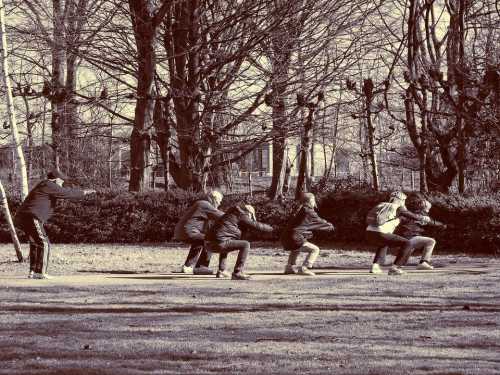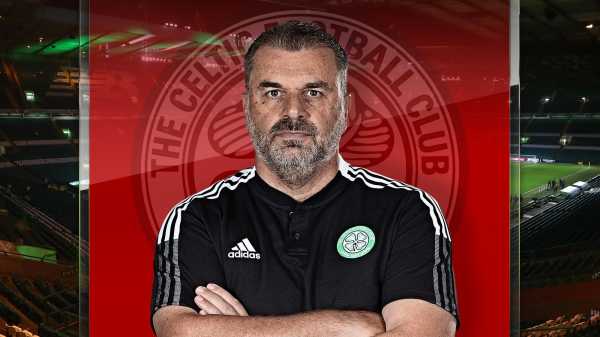
When Ange Postecoglou took over as Celtic manager last summer, the overriding question from many supporters was: who?
Those sceptics have not just been dealt with but also treated this season, as Celtic currently lead the Scottish Premiership title through an exciting, attacking brand of football.
The Bhoys’ task of dethroning Rangers from the highest echelon of Scottish football – following their invincible title-winning campaign last term – was partially aided by Steven Gerrard’s abrupt Ibrox departure to Aston Villa. But make no mistake, Celtic are worthy of the top spot they currently hold.


Rangers
Celtic
Sunday 3rd April 11:00am Kick off 12:00pm


- Stream the biggest moments on NOW for just £25 p/m
- Scottish Premiership live on Sky Sports
- Get Sky Sports
Postecoglou’s start to life at Parkhead did not begin brightly, failing to win his first three matches which resulted in a Champions League exit and an opening day defeat to Hearts in the league. Yet slowly but surely, Celtic rallied.
Now a serious title charge is well underway, with the green and white of Glasgow currently unbeaten in the league since the start of October. So what’s changed?
Trending
- Papers: Man Utd interview Pochettino
- Transfer Centre LIVE! Barca’s Laporta admits he likes Raphinha
- Southgate to shake England up for Ivory Coast clash
- Wolff: Merc enduring ‘exercise in humility… it’ll make us stronger’
- Abramovich ‘fine’ after suspected poisoning | US casts doubt on claims
- Rangers vs Celtic: The tactics dossier
- News & Gossip: Ivory Coast hope to lure Guehi away from England
- Ryan Mania: From Grand National glory to neck-breaking fall in 24 hours
- World Cup 2022: When is the draw for Qatar?
- Van Gaal warns Ten Hag off ‘commercial club’ Man Utd
- Video
- Latest News
Here’s how Postecoglou has managed to turn Celtic from a club losing its direction to Premiership leaders once again…
Recruitment
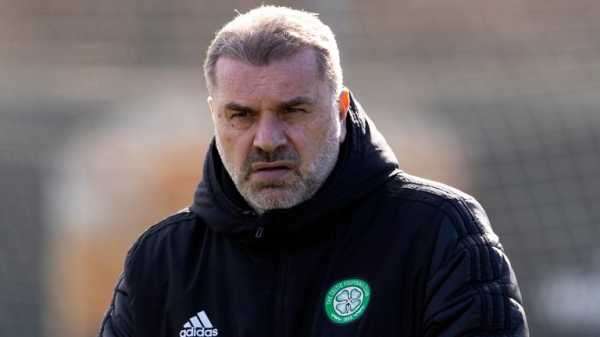
Image: Postecoglu has signed a number of players in his first two transfer windows
The Australian’s influence on the club started at the very beginning of his Parkhead reign. In his first press conference as Celtic boss, Postecoglou promised an “extensive” squad overhaul in his bid to get the Bhoys back at the top of Scottish football’s pecking order.
Also See:
The motivation behind it was to get every one of his players on board with his ideas, after months of uncertainty about the future of the club following Neil Lennon’s sacking last season. Captain Scott Brown quit the club due to those doubts, yet nobody could have anticipated the sheer numbers that followed.
Odsonne Edouard, Ryan Christie and Kristoffer Ajer all moved to England, while fellow regulars Olivier Ntcham and Leigh Griffiths were also let go. In total, Postecoglou trimmed Celtic’s squad by 14 players in his first few months – and every player was over the age of 20.
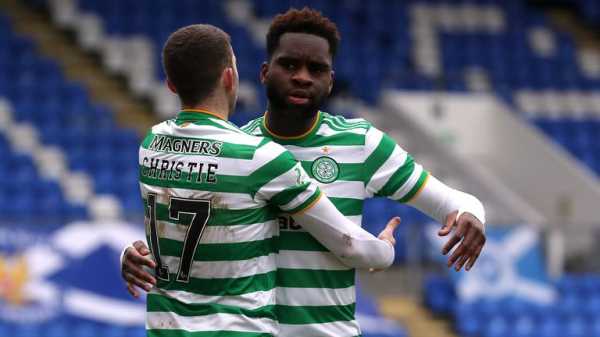
Image: Key players Ryan Christie (left) and Odsonne Edouard (right) left in Postecoglou's early days
Yet there was logic behind it. “I wouldn’t say there were people here who didn’t want to be here, I would just say there was uncertainty and, wherever there is uncertainty, it doesn’t help in trying to build something,” Postecoglou said after the summer transfer window closed.
“I’m trying to talk to the group about the future and what we’re building and where we’re heading, and if there’s uncertainty about whether people are going to be a part of that.
“The players kind of know ‘right ok, here we are, we’re all in this building and we’re moving together’. I think that helps just moving forward to accelerate those things.”
When it came down to replacing those departures, Postecoglou used both his knowledge of the lesser-known leagues and his own scouting expertise to bring in a dozen new players last summer. All but two – Joe Hart and James McCarthy – were over the age of 30, with Postecoglou stressing that the new recruits had to be the “right ages”.

Image: Joe Hart joined Celtic at the start of this season
And what success those dozen players have been on the pitch this season. Attackers Kyogo, Giorgios Giakoumakis, Liel Abada and Jota all hit double-digit goal tallies by March.
The excellent recruitment extended into January – with Postecoglou showing his market skills once again alongside new chief executive Michael Nicholson. Three new J-League stars joined top scorer Kyogo in the winter while, while midfielder Matt O’Riley has turned out to be a smart buy from MK Dons.

Image: Yosuke Ideguchi, Daizen Maeda and Reo Hatate all joined Celtic in January from the J-League
“The players I’ve brought in have hit the ground running and people ask why so quickly?” said Postecoglou in February. “It’s because I already know they’ve got the attributes I’m looking for and the rest is just understanding the gameplan.
“I knew that getting the right players was going to be the first critical part of what I am trying to create and how I will be judged in history. If I signed players that didn’t fit, it was going to be hard.
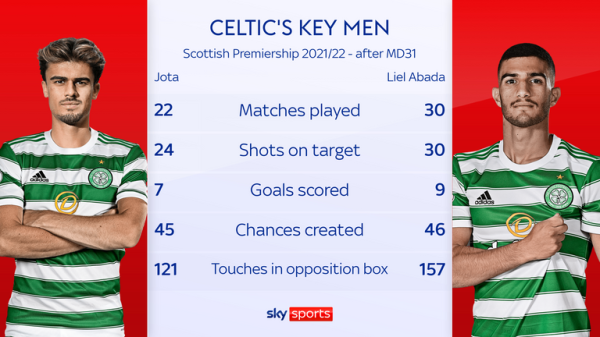
Image: Jota and Abada have impressed in their first season at Celtic
“I wanted to make sure the players fitted the ideology of the team I wanted us to be. They also had to hit the right demographic in terms of ages. That was all important. It’s always been a big part of what I do. You can’t have square pegs in round holes. It’s not just about getting talented footballers, it’s about getting people who fit into my football.
“A key one was Kyogo, who I knew from Japan. My team played against his and I watched him close up. I knew he had all the ingredients to be a success over here. As an individual player, but also because of the talent he had fitting into my team.”
More McGregor responsibility
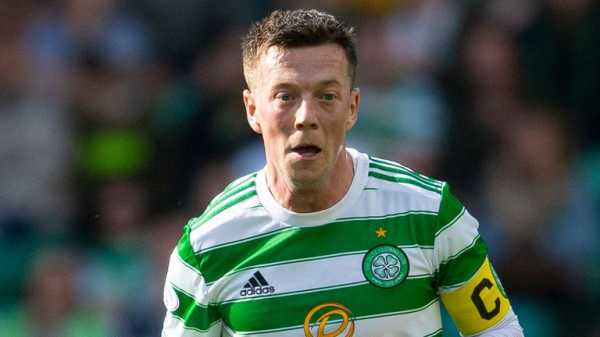
Image: Callum McGregor has impressed as Celtic captain
In losing captain Brown before Postecoglou arrived at the club, Celtic did not just lose a cult hero, but their most regular defensive midfield figure for over a decade. So how do you replace the irreplaceable?
Instead of finding an external option in the transfer market, Postecoglou went for the internal solution in Callum McGregor, who replaced Brown as both Celtic’s captain and midfield stalwart.
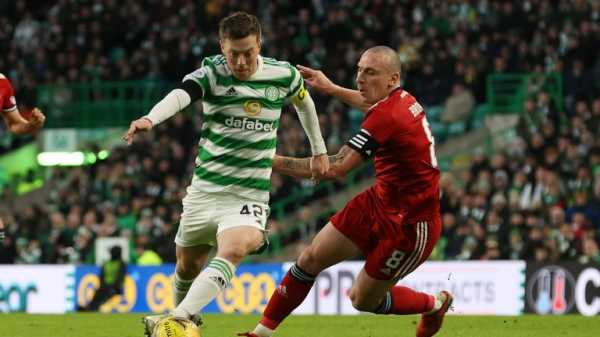
Image: McGregor replaced Scott Brown as captain of Celtic
McGregor, naturally a midfield eight option, has been transformed into a ‘six’ by the Australian coach. In simpler terms, the Scot has taken on a quarterback-style role in the squad, and is responsible for starting attacks from deep and breaking up opposition play.
The midfielder’s all-round game has improved this season, with McGregor making fewer forward passes per 90 than he has in previous top-flight campaigns – though his tackling and chance creation numbers are higher from that deeper and more sensible position.
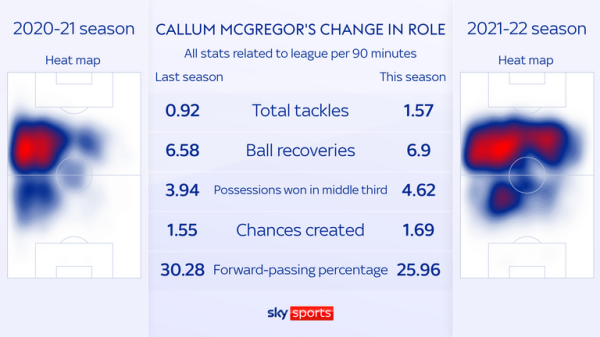
The 28-year-old’s more disciplined role means the likes of David Turnbull, Reo Hatate and Tom Rogic – the latter content with a lease of life in attack with his compatriot as manager – have the freedom to play higher up the pitch, but this defensive responsibility for McGregor has also aided his leadership skills too.
“It’s been good,” the midfielder said this month when asked about his new position. “It’s a different role within the team and the squad as well.
“Just on the positional aspect, I’m playing a little bit deeper and getting a lot of the ball. I’m starting a lot of the attacks as well which is good. So it’s something that I’ve really enjoyed as well.”
And Postecoglou himself has been very positive about McGregor’s individual displays this season, whilst also hailing the Scottish midfielder’s ability to handle the pressure of being Celtic captain.
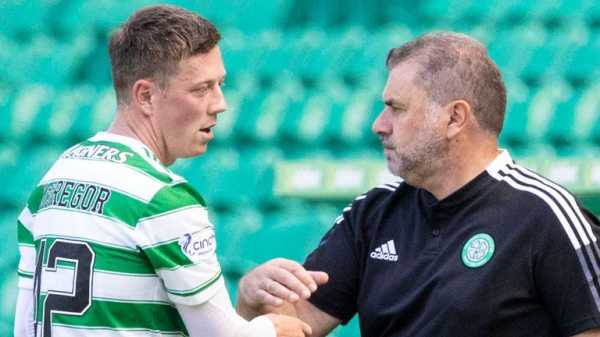
Image: Postecoglou (right) has hailed McGregor's leadership skills
“Callum’s football has been outstanding and that is where it starts,” the Australian said this month.
“If you are not contributing on the field, all the other stuff doesn’t really come into the same context. But he’s led from the front and he’s played fantastic football for us. He contributes in every game for us.
“People forget this is his first year as a leader, as captain of this football club. People know the responsibility that goes with that. It’s not an easy role.
“This is his first crack at steering a team through this part of the year and I am sure he will learn a lot about himself and the way he leads. But I can’t speak highly enough about Callum. He’s been outstanding.”
The style of play

Highlights of Celtic’s 3-0 win over Rangers which moved Postecoglou’s side top of the table
The moment that confirmed Postecoglou’s threat to shift the Old Firm bragging rights from blue to green and white came in their recent victory over Rangers at Parkhead.
Celtic quite simply blew their arch-rivals away with superb inter-play in the middle and final thirds. During a frantic opening half, the Bhoys moved the ball exceptionally quickly down the right-hand side through rotational running between full-back Josip Juranovic, midfielder O’Riley and forward Abada – with that combination crucial for Celtic’s second goal scored by Reo Hatate.
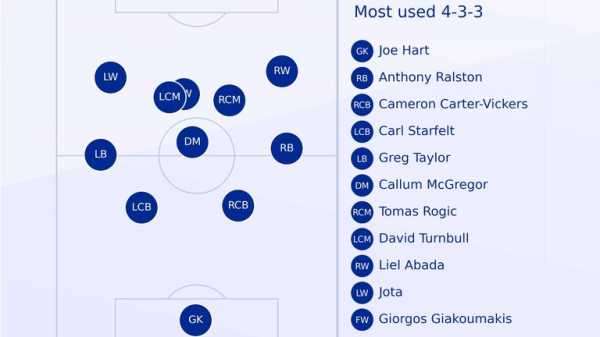
Image: Celtic's average positions this season under Postecoglou
That victory through intense interplay came in February, but the foundations for that movement began in Postecoglou’s first week at the club. In a July pre-season training session broadcasted by Celtic’s official media team, one area of Postecoglou’s philosophy was made abundantly clear.
“Ball speed is very important for us. Ball speed is number one,” the Australian bellowed to his players.
“Even when we’re keeping possession, I don’t want to see the ball move slowly. What does that mean? When we pass it, we pass it with purpose.”
Ultimately, Celtic have moved the ball much quicker with Postecoglou as boss than they did last season under Lennon. They lead the division for direct attacks resulting in a shot where over 50 per cent of movement is towards the opposition’s goal (66 – Rangers 55).
Meanwhile, the Bhoys are one of the best teams in Europe at controlling matches through keeping the ball. Out of all the teams in the continent’s top-flight leagues, only Manchester City and Paris Saint-Germain have completed more passes per game than Celtic this season.
While there is progression in their passing, there is patience in it too. Celtic have made 581 attacks consisting of ten or more passes that have resulted in a shot on goal, nearly 150 more than second-placed Rangers in that statistic.
Passing with a purpose was the message at the start and it has remained throughout. That is why Celtic have been able to muster an unbeaten league record between the start of October and the March international break – by controlling matches better.
Attack, attack, attack
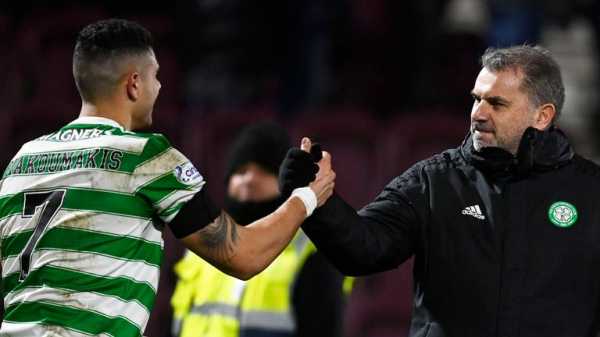
Image: Giorgos Giakoumakis has scored 12 goals this season under Postecolgou
Failing to keep up with Rangers from a goalscoring perspective was one of the major reasons why the Scottish league title went to Ibrox last season.
Gerrard’s side managed to score 14 more goals than the Bhoys in the last campaign but now the tables have well and truly turned. Postecoglou’s Celtic now have 14 more goals from open play than their arch-rivals, while the green and white half of Glasgow average around 15 shots on goal from those scenarios per league game.
Celtic’s open play goal tally should actually be a lot more, given they have a league Expected Goals (xG) high of 66.3. Rangers, meanwhile, only create 48.4 xG from open play.
In the final third, Postecoglou’s side aren’t just relentless with the ball but without it too. Celtic allow their opponents to have fewer passes in their defensive third than any other Scottish top-flight team, thereby showing the effectiveness of their press, while they also have the most turnovers leading to goals in the league.
That high-pressing ideology was also drilled into Celtic’s players by their Australian coach in the same pre-season training session during his first few weeks at the club.
“If we lose the ball, we f****** want us to win it back,” he roared. “Keep the pressure on, the more we are a team that don’t want to play against us, the more effective we’ll be. They’ll know they can’t get a rest against us.
“We never stop, we never stop. We’ll stop at half-time and we’ll stop at the end of the game when we’re celebrate. But during the game we never stop. If the opposition wants to stop, that’s good for us – we’ll f****** take advantage.”
Inverted full-backs

Image: Celtic’s Josip Juranovic has impressed since joining the club
As a defensive player himself, Postecoglou hated playing the traditional wide full-back role due to the lack of space available to him near the touchline. So it’s no surprise to see Celtic adopting narrow full-backs throughout the course of the season.
In academy product Anthony Ralston and new-signing Josip Juranovic, this is the area which epitomises the Australian’s ability to improve this Celtic squad through both the existing crop he inherited at Parkhead and the new signings he brought in.

Image: Ralston feared his Celtic career was over before Postecoglou arrived at the club
Both Ralston and Juranovic have been in and amongst the goals this season, with five goals each and ten assists between them by March. That is mainly down to them taking up more central areas than before, while there are collective team benefits to this tactical tweak as well.
The narrow full-backs help to overload the middle of the park, but they also grant more space to wider players such as Jota to affect matches. Meanwhile, the likes of McGregor and Rogic can take the midfield higher up the pitch, which further strengthens their control on the game by pushing their opposition back.
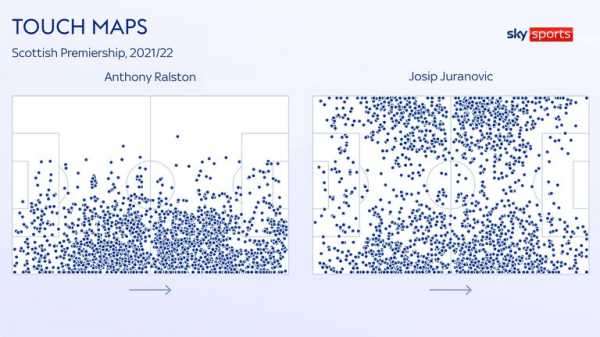
But most importantly, the players have responded brilliantly to the switch in full-back system, not least right-back Ralston whose new role was influential in him signing a new contract at Parkhead following Postecoglou’s new-found faith in him.
“At the beginning it was new and I had to learn it (the new role),” Ralston told Sky Sports News. “Every day in training it was something we worked on.
“When I found myself in midfield at the beginning it was strange, I’ve never had to check around about me as everything is usually in front of me.
“He had very clear instructions on how he wanted me to do it and that made it a lot easier for me in terms of learning that role. I’m loving playing the style of football he’s implemented into the team.”

Former Celtic right-back Mark Wilson caught up with current Parkhead full-back Anthony Ralston to discuss his career and hopes for the season ahead
“It’s been a thing that the gaffer’s tried to implement here,” midfielder McGregor revealed in October when asked about the change in full-backs. “I think it’s worked reasonably well. We’re getting better at it all the time. You can start to see one [full-back] coming in and one staying out giving us a little bit of width.
“So all it does is slide you across a little bit and gives you the two controlling players to build up and try to outnumber the opposition. So it’s just important that whatever fullback comes in, you then just balance it off on the side, and then it’s about quick combinations and trying to break through the press.
“And then on transition it’s just important first and foremost we control the middle of the pitch, force them wide, and then everyone recovers back centrally and we defend from there.”

Win £20,000 with Super 6!
Correctly predict five scorelines to scoop £20,000 with Super 6 on Saturday. Play for free, entries by 3pm.
Sourse: skysports.com
